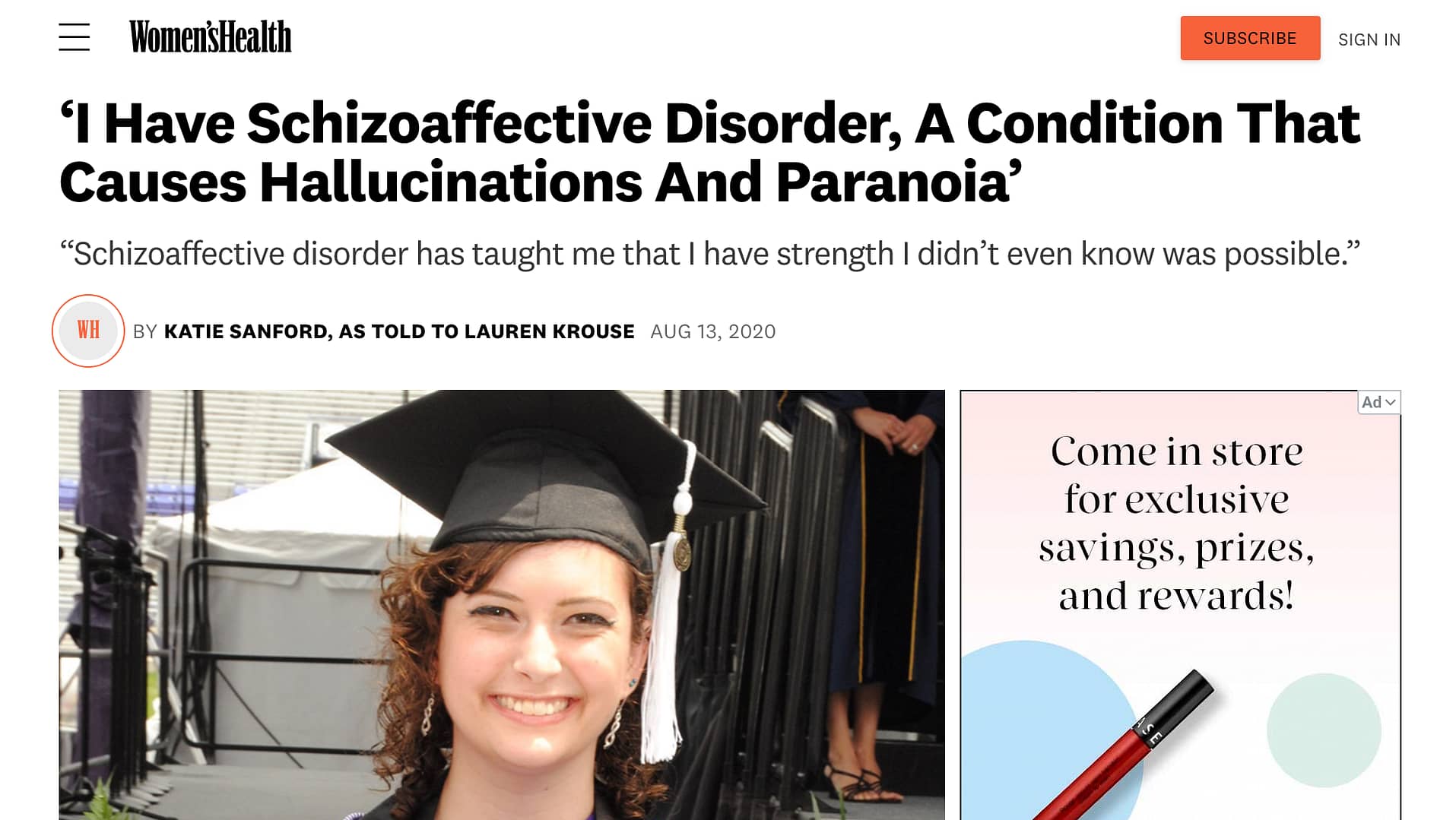-
“Close to Your Chest”- On Working Openly With Psychosis
Dear Professor, Back around 2011, I applied for a position in your lab as a research assistant. I hadn’t been your student, but your research interests were near enough to mine that the job caught my attention. I eagerly told you that part of why I was interested in the position was because of my own experiences with severe mental illness, specifically, schizoaffective disorder. Your face became serious. You told me that that was something I should keep close to my chest when seeking a job. In the moment, I was fiercely upset. I vowed that I would not keep this close to my chest. Because I should not have…
-
Watch Now: “The First Signs of My Schizoaffective Disorder” on YouTube
In an effort to provide more detailed information in video format, I’m venturing into YouTube. This video was inspired by conversations I’ve had with others about finding ways to catch the first signs of schizophrenia spectrum disorders like schizoaffective disorder and schizophrenia. As well as part of why that can be so difficult. Here’s what happened after I sought help for what I was experiencing. A few weeks after these changes in my functioning and mindset occurred, I began seeing a therapist and psychiatric nurse practitioner. Because I was already in treatment with a doctor with whom I felt comfortable (and because I was absolutely determined to do the whole…
-
5 Things That Help Me When I’m Experiencing Psychosis
Schizoaffective disorder is a rollercoaster. An illness on the schizophrenia spectrum, it is a cocktail of mood symptoms and psychosis that’s well shaken and then lit on fire. Despite taking medications and being in therapy, I do still experience symptoms sometimes, including symptoms of psychosis like hallucinations. And when I’m fighting my way through a sea of psychosis, I don’t expect people to know what to do. For a very long time, I didn’t know what to do either. I spent years bracing myself through my symptoms as I waited for medication adjustments to take effect. But with every episode of psychosis that I’ve endured, I’ve learned new things about…
-
The Role of Emotional Dysregulation in My Life with Schizoaffective Disorder
My emotions don’t make sense to me sometimes. They sound foreign – instructions for how to act and respond that are written in code. They build and crash down on me like a tidal wave. And someitmes I can’t even identify what they are. They warp and bend and dance until they all look the same to me, and I don’t like what I see. Even happiness and excitement can become overwhelming and trigger negative feelings or even symptoms for me until I want to scream. This emotional dysregulation has played a key part in my life with schizoaffective disorder, and, looking back, it’s been around long before my diagnosis.…
-
When Words Escape Me – Schizoaffective Disorder And Written Communication
TW: Mention of suicidal thoughts If you knew me in high school, you would probably have seen me scribbling in a journal or adding another freewrite filled with metaphors to my binder. My computer is full of short notes, poems, essays, and stories. But at a certain point, they stop. The scrawled pages of my journal go blank. The files on my computer run out. With its onset, schizoaffective disorder stole the words from my mind. Words were more than communication or a hobby for me. Words were how I sorted out my thoughts and emotions and how I figured out who I was and who I wanted to be.…
-
Society Shouldn’t Tell Me How To Experience My Mental Illness
Society tells us many things, but, when it comes to how people experience mental illnesses, it's time for society to stop and listen.
-
Through A Different Lens – How A Person’s Diagnosis Can Distort Our View
I remember sitting in the car thinking, “things are never going to be the same. I will never be capable of the things I was capable of before.” Twenty minutes earlier, I had been sitting on the couch in my psychiatric nurse practitioner’s office hearing the word “schizophrenia.” After that moment, I never saw myself the same. And the longer I live with what is now diagnosed as schizoaffective disorder, the more I see how this shift in view is not unique to me or even only those living with mental illnesses. Parents, doctors – anyone really, can easily slip into viewing someone through a different lens once they receive…
-
Dear Mental Health Professionals – You Need People With Lived Experience On Your Team. Here’s Why.
Dear researchers, clinicians, and other professionals who work with people who experience psychosis, My name is Katie and I have been living with schizoaffective disorder since 2008. And you need people like me. I don’t mean as patients or research subjects or consumers of any kind. I mean as a fellow professional. Because my lived experience, and that of others, can change the way we look at and treat those living with psychosis. I can give you insights you can’t find anywhere but the minds of those living with psychosis. I’ve been a psychosis advocate for years. I’ve worked independently, as an ambassador for NAMI Chicago, and, most recently, as…
-
What I didn’t have to give up because of schizoaffective disorder
It’s all gone. That’s what I thought when I received my schizophrenia diagnosis, later updated to schizoaffective disorder. In my head, I watched everything I’d wanted and planned go up in flames. At first, I was resigned to it. But, over a year later, mental health advocacy caught my eye and I took up the chant that a diagnosis on the schizophrenia spectrum is not a death sentence. And, though I stand by that, I think mental health advocacy, at least when it comes to severe mental illness, misses some things. This illness isn’t my fault, but I still felt like, by having it, I had to give certain things…
-
Invalidation – Silent and Destructive
Invalidation is a silent pandemic. People with conditions, illnesses, and disabilities of all kinds are subject to rampant invalidation, sometimes from all sides. In many cases, even the people who do or claim to care about an individual can invalidate them regularly. And they often don’t realize they are doing it. But we don’t talk about it. Those who feel invalidated often don’t feel comfortable or safe speaking up. Some believe the invalidating statements to be true. But when someone does bring it up to the invalidators, it doesn’t always go well. Over the years I have faced invalidation in many forms and from many people, but the most invalidation…






